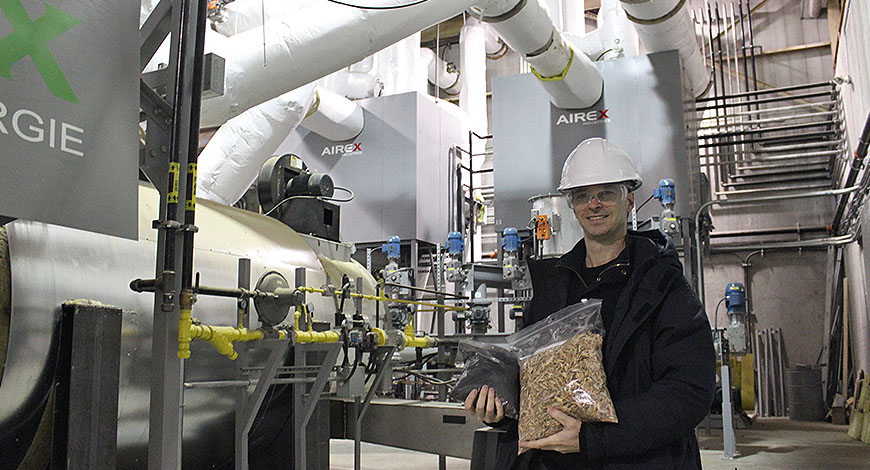
Biocoal from Biomass
An Emerging Product
“The goal is to produce 15,000 tonnes of biocoal per year, which would require a supply of up to 40,000 tonnes of biomass per year depending on the level of humidity,” points out the CEO, Sylvain Bertrand, who would like to move to other phases of expansion on the LaPrade park site. As it is an emerging product, since there was almost no industrial production up until now, the challenge will be to commercialize. “It’s the chicken and the egg. Industries don’t develop products for which there’s no supply,” adds the CEO. “Just to test biocoal, a coal-fired power plant in the United States needed 8,000 tonnes. That’s half our annual production,” he continues. “We will never manage to replace all coal because there won’t be enough biomass in the world. The goal is to replace 3 to 5%.” Various partners from the industry and the academic world are in fact very interested in the work at Bécancour. Some ten research and development projects are underway for a total of $2.4 million.A Unique Technology
The Bécancour plant is the only one of its type in Canada, while there are three or four others in the world. However, the CarbonFX technology developed by Airex Energy is unique, which could prove to be a strong advantage for the company. Thanks to a patented innovation, the company is able to considerably reduce the time needed for the critical phase of the process—the torrefaction—thanks to the design of its reactor. By injecting gases into the reactor, the particles only spend three seconds in the reactor, 600 times shorter than the competition, whose rotating oven process requires thirty minutes for torrefaction. Airex’s equipment is also much smaller, does not require a biomass boiler to produce heat, and includes an integrated pre-drying system. Its selling price thus gives it an advantage over competitors when it comes time to market the technology, a niche the company plans on developing to continue its growth.What is it for?
Biocoal
Fuel to replace coal in coal-fired power plants and thus reduce greenhouse gas emissions, or to produce energy for cement plants.Biochar
To increase soil fertility or restore contaminated soils.Biocomposites
For plastic composites, in the automobile industry, while biocoke can be used to replace coke in some metallurgical processes. Source : Sébastien Lacroix, Le Courrier Sud. «Du biocharbon à partir de biomasse», TC Media, Le Courrier Sud, Section: Actualités > Économie - Publié le 11 frévrier 2016
Head Office
2500 Bernard-Lefebvre Street
Laval, Québec, Canada, H7C 0A5
450.661.6498
Bécancour Plant
103-4170 La Prade Blvd.
Bécancour, Québec, Canada, G9H 0B6
